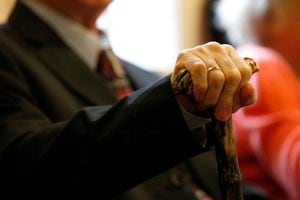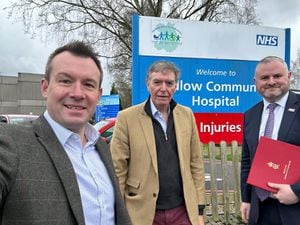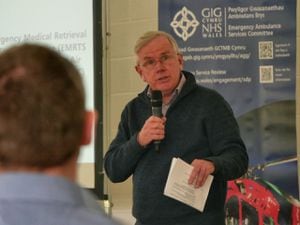2,000 'living with undiagnosed dementia' in Shropshire
More than 2,000 older people in Shropshire may be living with undiagnosed dementia, according to estimates by the NHS.

Figures collected by GPs show that in Shropshire and Telford & Wrekin there are 4,751 people over 65 who have been diagnosed with some form of dementia.
But, estimates from the NHS, based on the on the age profile and gender of patients, suggest the real figure for the county could be as high as 6,831.
That means an estimated 2,080 pensioners are living with the debilitating illness that has not been formally recorded by their doctor.
The figures are being collected in response to the Prime Minister's Challenge on Dementia, which was set up by the previous PM, David Cameron.
The Department of Health wants GP surgeries in England to increase the rate of diagnosis.
The latest data, for November, shows that the diagnosis rate for the whole of England is 68.2 per cent but area to area this varies wildly from 25 per cent to 90 per cent.
Shropshire is beating the national figure with a diagnosis rate of 70.6 per cent, while Telford & Wrekin is below the benchmark with a rate of 66.6 per cent.
Sally Copley, Alzheimer’s Society’s Director of Policy Campaigns and Partnerships said: "The essential first step to the care and support everyone should have a right to is a diagnosis.
"Research has found that people with dementia who live alone, or in care homes, or from BAME communities, have lower rates of diagnosis – contributing to the variation we’re seeing across the country.
“People tell us that our support is a lifeline, but we cannot reach them if we do not know who they are.
Importance
"In areas with low diagnosis rates the Government has to work with the NHS to find out what’s going on. People with dementia deserve better.”
However, the Royal College of General Practitioners said that doctors realised the importance of spotting the signs of dementia but in some circumstances an early formal diagnosis was not in the best interests of the patient.
Professor Helen Stokes-Lampard, Chair of the RCGP, said: “We recognise that timely diagnosis of dementia can be helpful in that it provides an opportunity for some patients to get their affairs in order and make long-term plans for their care.
“But pressuring patients to seek early advice and a diagnostic label, especially for short-time memory lapses, can create considerable worry for both them and their loved ones, especially when follow-on services and treatment options are limited.
“There may also be some instances where GPs might decide to delay giving a formal diagnostic label, especially in the early stages, if there is minimal impact on the quality of a patient’s day-to-day life."
Dementia is a term used to describe symptoms such as loss of memory, behaviour changes and problems in reasoning. The most common cause of dementia is Alzheimer's disease, which accounts for about 60 per cent of cases, but it can be the result of brain damage caused by a stroke or neurological conditions such as Parkinson's.
Dementia can affect people at any age and across England 465,000 people have been diagnosed.
But the vast majority of cases are in older people. After the age of 65 the likelihood of dementia rises. It peaks for men in their early 80s when a quarter suffer from dementia. The peak for women is in their late 80s when the rate reaches 27 per cent.
Early diagnosis is vital, says charity
Early diagnosis of dementia is vital for ensuring people get the right help, according to an organisation which supports sufferers.
Kevin Moore, director of operations at Age UK Shropshire Telford & Wrekin said that because of the fear associated with the condition, some people avoid seeking the diagnosis, which can lead to them not accessing support.
Mr Moore said: “The importance of early diagnosis in dementia is the same as any other disease: the sooner the condition is diagnosed, the sooner the patient can receive the relevant treatment and support. This is really important in terms of allaying worries, slowing down the progression of the disease and controlling symptoms.
"Unfortunately we know that many people fear a dementia diagnosis which then delays them seeking the support they need.”
Mr Moore urged people to speak to doctors if they have concerns.
He said: “Symptoms can include memory loss or changes to the way we speak, think or feel. If they have lasted more than six months we would encourage people to speak to their GP.”
He also spoke about how his organisation can provide support which helps people deal with the daunting prospect of a dementia diagnosis.
Support
He said: “Age UK Shropshire Telford & Wrekin works closely with organisations such as The Alzheimers Society, NHS Memory Services and Admiral Nursing teams. Early diagnosis enables patients and their loved ones to prepare for the future – but this can be a worrying time.
"Expert advice and treatment is critical but we also find that people with an early diagnosis really benefit from peer support – speaking to others who are going through similar things to themselves. We are setting up groups around the county which enable those with an early diagnosis and their loved ones to come together and share experiences and information, and in so doing, make the future a little less frightening.”
The Department of Health wants GP surgeries in England to increase the rate of diagnosis.
Sally Copley, from the Alzheimer’s Society, director of policy campaigns and partnerships said: “The essential first step to the care and support everyone should have a right to is a diagnosis.
“Research has found that people with dementia who live alone, or in care homes, or from BAME communities, have lower rates of diagnosis – contributing to the variation we’re seeing across the country.
“People tell us that our support is a lifeline, but we cannot reach them if we do not know who they are.
“In areas with low diagnosis rates the government has to work with the NHS to find out what’s going on."





